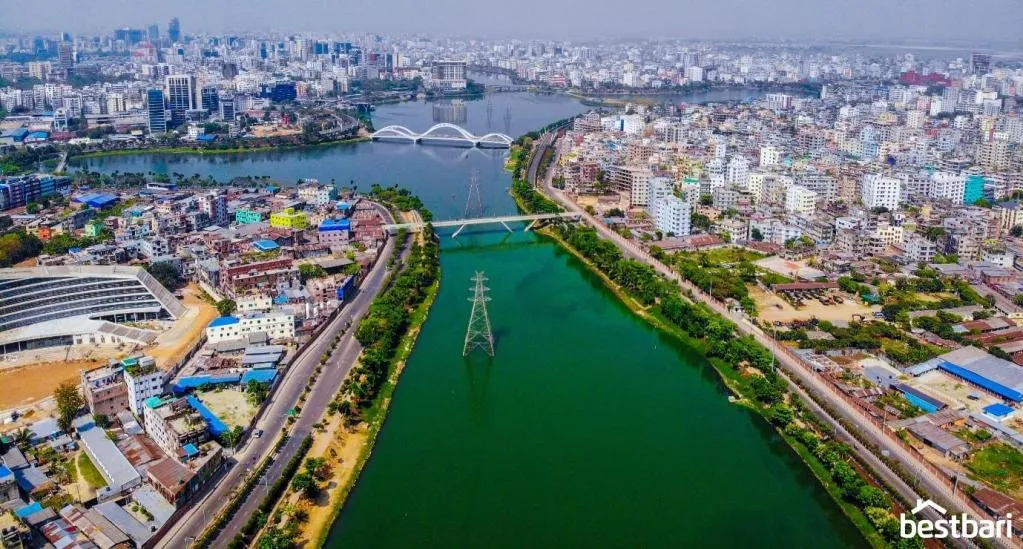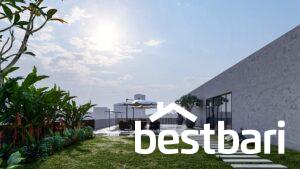
Reading time: 8 minutes, Category: Lifestyle
Access premium flat sales in Dhaka with BestBari, the trusted online real estate company of Bangladesh.
Over the past few decades, this South Asian nation has experienced remarkable economic and industrial growth and is now hailed as one of the fastest-growing economies in the world. In this article, we will delve into the factors that have contributed to Bangladesh’s economic resilience and explore its immense potential for future growth.
One of the key drivers of Bangladesh’s economic success is its booming garment industry, which has become a major global player in the textile and apparel sector. The country’s competitive labour costs, coupled with its skilled workforce and favourable trade policies, have attracted numerous international brands to set up manufacturing units here.
Furthermore, Bangladesh has made significant strides in other sectors such as agriculture, pharmaceuticals, information technology, and shipbuilding. Its strategic location as a gateway to the Indian Ocean and its strong focus on export-oriented industries have paved the way for sustained economic growth and foreign direct investment.
As we explore the growth and potential of Bangladesh’s economy, we will uncover the various challenges the country faces and the strategies it has employed to overcome them. Join us on this journey to discover how Bangladesh continues to defy odds and carve its path towards becoming a thriving economic powerhouse in the South Asia region.
Factors contributing to Bangladesh’s growth
Bangladesh’s economic growth can be attributed to several key factors. Firstly, the country has made significant progress in poverty reduction and human development. The government’s commitment to education and healthcare has resulted in an educated and healthy workforce, which has played a crucial role in driving economic growth.
Secondly, Bangladesh has capitalized on its demographic dividend. With a large young population, the country has a significant labour force that is both skilled and cost-effective. This has attracted foreign investors who have established manufacturing units, particularly in the garment sector, taking advantage of Bangladesh’s competitive labour costs.
Furthermore, the government’s focus on infrastructure development has been instrumental in driving economic growth. Investments in roads, ports, and power generation have improved connectivity and facilitated trade, making Bangladesh an attractive destination for foreign direct investment.
Looking forward, there is even further potential for economic development for Bangladesh as the country continues to invests in human capital development, which is essential for the country’s future growth. Bangladesh’s momentum will continue if the country continues to invest in education and skill development programs to create a highly skilled workforce capable of driving innovation and productivity.
The key sectors driving Bangladesh’s economy
The garment industry is undoubtedly the key driver of Bangladesh’s economy. The country is now the second-largest exporter of garments in the world, providing employment to millions of people, especially women, and contributing significantly to the GDP. Bangladesh’s competitive labour costs, coupled with its skilled workforce and favourable trade policies, have attracted numerous international brands to set up manufacturing units here.
In addition to the garment industry, Bangladesh has made significant strides in other sectors as well. The agriculture sector, for instance, plays a vital role in the country’s economy, employing a large portion of the population and contributing to both domestic consumption and export. Furthermore, Bangladesh has emerged as a major player in the pharmaceutical industry, with several companies gaining recognition for their high-quality generic medicines.
The information technology sector is also growing rapidly in Bangladesh, with a focus on software development and IT-enabled services. The country has a pool of talented programmers and engineers, and the government has implemented initiatives to promote the growth of the IT industry, including the establishment of technology parks and tax incentives for IT companies.
Lastly, the shipbuilding industry has gained momentum in recent years, with Bangladesh becoming one of the leading shipbuilding nations in the world. The country’s strategic location as a gateway to the Indian Ocean, along with its competitive pricing and skilled workforce, has attracted orders from international clients.
Foreign investments in Bangladesh
Foreign direct investment (FDI) has played a significant role in Bangladesh’s economic growth. The government has implemented policies to attract foreign investors, including tax incentives, simplified procedures for business registration, and protection of intellectual property rights.
Several multinational companies have invested in Bangladesh, particularly in the garment and textile sectors. This has not only created employment opportunities but has also led to technology transfer and skill development. Additionally, foreign investments have contributed to the modernization of infrastructure, especially in the power and transportation sectors.
Furthermore, Bangladesh has been successful in attracting investments from countries like China, Japan, and India. These investments have been directed towards sectors such as energy, infrastructure, and manufacturing, further boosting the country’s economic growth.
Government policies and initiatives supporting economic growth
The government of Bangladesh has implemented various policies and initiatives to support economic growth. One such initiative is the “Digital Bangladesh” vision, which aims to transform the country into a knowledge-based society through the widespread use of information and communication technology. The government has invested in building digital infrastructure, promoting e-commerce, and providing digital services to citizens.
The government has also focused on improving the ease of doing business in Bangladesh. Reforms have been implemented to streamline business registration procedures, reduce bureaucratic hurdles, and facilitate foreign investment. The establishment of special economic zones and industrial parks has further incentivized investment and provided a conducive environment for businesses to thrive.
Furthermore, the government has prioritized human resource development through investments in education and skill development programs. This has resulted in a more skilled and productive workforce, which is essential for sustained economic growth.
Bangladesh’s role in regional and global trade
Bangladesh’s strategic location as a gateway to the Indian Ocean has positioned it as a key player in regional and global trade. The country has benefited from regional trade agreements, such as the South Asian Free Trade Area (SAFTA) and the Bay of Bengal Initiative for Multi-Sectoral Technical and Economic Cooperation (BIMSTEC).
Moreover, Bangladesh has expanded its trade relations beyond South Asia. The country has signed bilateral and multilateral trade agreements with countries around the world, including the United States, China, and the European Union. These trade agreements have facilitated market access for Bangladeshi products, particularly in the garment industry.
Bangladesh’s participation in global value chains has also been instrumental in its economic growth. The country has become an important sourcing destination for global brands, providing them with a cost-effective and efficient supply chain. This integration into global value chains has not only boosted exports but has also led to technology transfer and skill development.
The favourable trade policies implemented by the government have also played a crucial role in the success of the garment industry. The country has negotiated preferential trade agreements with major economies, such as the European Union and the United States, allowing for duty-free access to these markets. This has provided a competitive advantage to Bangladeshi exporters and has contributed to the sector’s sustained growth.
Conclusion: The bright future of Bangladesh’s economy
Bangladesh has come a very long way since its independence in 1971. Bangladesh’s economy has shown remarkable resilience and potential for future growth. The country has leveraged its demographic dividend, competitive labour costs, and strategic location to attract foreign investments and become a major player in global trade. With the right policies and investments in infrastructure and human capital, Bangladesh has the opportunity to become a dominant player in Asia and further diversify its economy and become a thriving economic powerhouse in the coming years.
BestBari is your trusted real estate company of Bangladesh with exclusive access to premium flat sales in Dhaka. Please contact us to find how we can help you with your property journey in Bangladesh.












